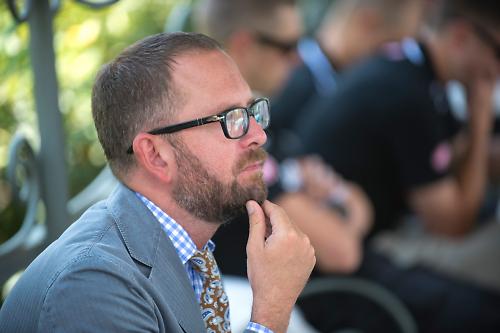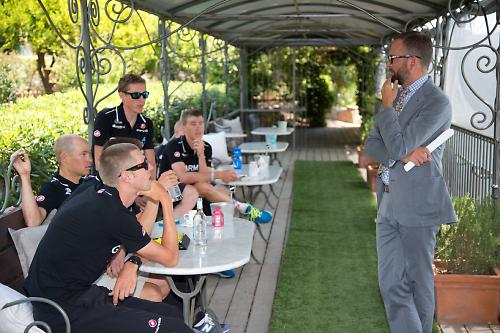- News
- Reviews
- Bikes
- Components
- Bar tape & grips
- Bottom brackets
- Brake & gear cables
- Brake & STI levers
- Brake pads & spares
- Brakes
- Cassettes & freewheels
- Chains
- Chainsets & chainrings
- Derailleurs - front
- Derailleurs - rear
- Forks
- Gear levers & shifters
- Groupsets
- Handlebars & extensions
- Headsets
- Hubs
- Inner tubes
- Pedals
- Quick releases & skewers
- Saddles
- Seatposts
- Stems
- Wheels
- Tyres
- Tubeless valves
- Accessories
- Accessories - misc
- Computer mounts
- Bags
- Bar ends
- Bike bags & cases
- Bottle cages
- Bottles
- Cameras
- Car racks
- Child seats
- Computers
- Glasses
- GPS units
- Helmets
- Lights - front
- Lights - rear
- Lights - sets
- Locks
- Mirrors
- Mudguards
- Racks
- Pumps & CO2 inflators
- Puncture kits
- Reflectives
- Smart watches
- Stands and racks
- Trailers
- Clothing
- Health, fitness and nutrition
- Tools and workshop
- Miscellaneous
- Buyers Guides
- Features
- Forum
- Recommends
- Podcast
news
Garmin-Sharp team manager Jonathan Vaughters talks expertise, change and managing a modern team
On the eve of the Tour de France, Garmin-Sharp team manager Jonathan Vaughters spoke about modern team maagement, his goals and how he takes personal responsibility for the team selection for the Tour de France.
Jonathan Vaughters does things differently. As a child he once drove his go-kart to the 7-Eleven. At 40mph. “It infinitely annoyed me that that was against the law,” he said in a 2008 interview.
As a team manager he’s taken a very public stance against drugs in cycling, and also broken the mould of the team manager as universal expert in tactics, training and logistics that was the way of European cycling until recently.
In an interview with Tom Southam on Humans Invent, Vaughter says that he sees running a cycling team as much more like running a modern business.
Vaughters says: “It’s basically giving people a voice in an organization and giving weight to their opinion, but also making them responsible for that opinion and for the consequences of that opinion. I consider that it’s not dictatorial, it’s not autocratic; it is very much a process where I let the experts do their job without me meddling in everything because I am not as much of an expert as any of those people in that area.”
Those experts include British former pro Charly Wegelius and the team’s business manager Matt Johnson. “Charly Wegelius is an absolute expert at race tactics, I’m not as good as he is, but I am about 80% as good as he is. In communications Marya [Pongrace] is an absolute expert – could I do her job? Not as well as she could, but then I understand it better than Charly Wegelius or Matt Johnson does.
“I understand all those areas, and maybe that is what is more unique about my position than anything else.
“It is enough for me to make decisions based on their recommendations, and what they’re showing me, but it’s not enough that I should just sort of push over the top of anyone because they are all better in their individual fields than I am.”
Choosing the Tour team

One area where Vaughters does make the final decisions is in selecting a team for the Tour de France.
The process involves gathering data and impressions from sport scientist Robbie Ketchell, the team’s medical staff, and the sport directors.
“And then, of course, how are they racing,” says Vaughters. “So you kind of combine all of that the quantitative and the subjective and so on, and then what I had everyone do this year was render an opinion as to which riders they think should go to the Tour de France. I took a look at their final opinions and selections and the reasoning behind those and then basically just came up with a final decision based on all of that.
“It is a fairly complicated process but in the end it is my final choice. I don’t do that with any other race. But in this race, because it is always more prone to controversy and upset and so on, and in the end it is basically 70% of the commercial value of the team from a sponsorship standpoint, I feel I need to put my name behind the final decision.”
Priorities
For any business, deciding where to spend money to get the best return is the most vital skill of a manager. It’s even more important for a team like Garmin-Sharp that doesn’t have a huge budget compared to some teams.
“Our resources are directed at speed and in results in big races,” says Vaghters. “We recruit talent. You know we have great guys who get along well, but ultimately we look at end talent. So that is where our recruiting policies are with riders.
“With staffing and with technology we focus on bikes and the fuel – so, nutrition and bikes. That is the way our budget is structured: what is essential for maximum performance, not fluff and extras. I mean, of course, would the riders like more soigneurs and more mechanics and more comfort and a big cushy bus? Of course – they’d love it. But what we have is an organization that is set up to maximize the efficiency of their results and their talent.
“Don’t get me wrong, when we hit the start line in Nice for the team time trial there is no team that has a setup that is faster than ours. In terms of the bikes, the training that went into that, the information that went into selecting the team is second to none. In fact I’d say we’re absolutely the world’s best. But, when they get to the bus afterwards you know… the motor might start, or it might not…” (Laughs)

That a team’s funding comes only from sponsorship, rather than, say, a share of TV rights revenues, is one of cycling’s big problems, according to Vaughters.
“The business model of cycling is sponsorship revenue driven, which is not a fundamentally stable business model, which is regrettable and unfortunate as I think that is the root cause of the instability problems in cycling. At the end of the day I’ve done a lot to try to change that and pushed as hard as I can in the various areas and people that are in a decision making position to change those policies, but it hasn’t moved quite as fast as I’d like.”
“I don’t really care about financial growth because I feel like the sport has actually grown quite a bit and if it continues to grow, great. But that is not my end objective; you know, more money to pad my wallet. My end objective is that the environment is safer, healthier and more stable.”
Targeting the Tour
Vaughters’ biggest success to date has been Ryder Hesjedel’s victory in last year’s Giro d’Italia. But there is one prize that has eluded him so far.
“I think that for every manager, and for myself especially, the long-term goal is to win the Tour de France,” Vaughters says. “Can that be with Dan Martin or Andrew Talansky? Well it could – I don’t know whether it will be, but it could, and we will continue to work toward that.
“Could that some day be another one of our young guys we have now? Could be, absolutely. But the point is that as long as our process of selecting talent and nurturing talent is in place one of these days we are going to hit on somebody who is going to do it for us, and we are going to have the infrastructure and the teammates and the work ethic in place to support them in that.”
John has been writing about bikes and cycling for over 30 years since discovering that people were mug enough to pay him for it rather than expecting him to do an honest day's work.
He was heavily involved in the mountain bike boom of the late 1980s as a racer, team manager and race promoter, and that led to writing for Mountain Biking UK magazine shortly after its inception. He got the gig by phoning up the editor and telling him the magazine was rubbish and he could do better. Rather than telling him to get lost, MBUK editor Tym Manley called John’s bluff and the rest is history.
Since then he has worked on MTB Pro magazine and was editor of Maximum Mountain Bike and Australian Mountain Bike magazines, before switching to the web in 2000 to work for CyclingNews.com. Along with road.cc founder Tony Farrelly, John was on the launch team for BikeRadar.com and subsequently became editor in chief of Future Publishing’s group of cycling magazines and websites, including Cycling Plus, MBUK, What Mountain Bike and Procycling.
John has also written for Cyclist magazine, edited the BikeMagic website and was founding editor of TotalWomensCycling.com before handing over to someone far more representative of the site's main audience.
He joined road.cc in 2013. He lives in Cambridge where the lack of hills is more than made up for by the headwinds.
Latest Comments
- Mr Blackbird 3 sec ago
"At the going down of the sun, it will get in our eyes and cause us to crash into things."
- Rendel Harris 8 min 21 sec ago
Been living in the area thirty years now and Brixton Cycles (and local riders wearing their famed Rastafarian colours jersey) has been an iconic...
- Rendel Harris 16 min 25 sec ago
There will be a delay with anything the human brain is asked to process, but the Varia identifies hazards up to 140m away and shows them on the...
- Hirsute 46 min 14 sec ago
That's nothing on the fentanyl sellers, just think how bad it is for them.
- chrisonabike 2 hours 13 min ago
Does the "super-loud yellow" also help alert (non-deaf / non-earbud-wearing) pedestrians? Or will it just mean dogs bark at me?
- Festus 3 hours 3 min ago
One thing that bothers me is the use of antidepressant med and driving, it never gets picked up by police. Most of these types of medicines state...
- chrisonabike 5 hours 3 min ago
Indeed - but again these are perhaps questions we should keep asking. Even if the immediate answer is "well we are where we are" or "how on earth...
- wtjs 6 hours 51 min ago
Then smash bad driving behaviour very hard...



Add new comment
1 comments
"Don’t get me wrong, when we hit the start line in Nice for the team time trial there is no team that has a setup that is faster than ours."....
...think I might have got him wrong...